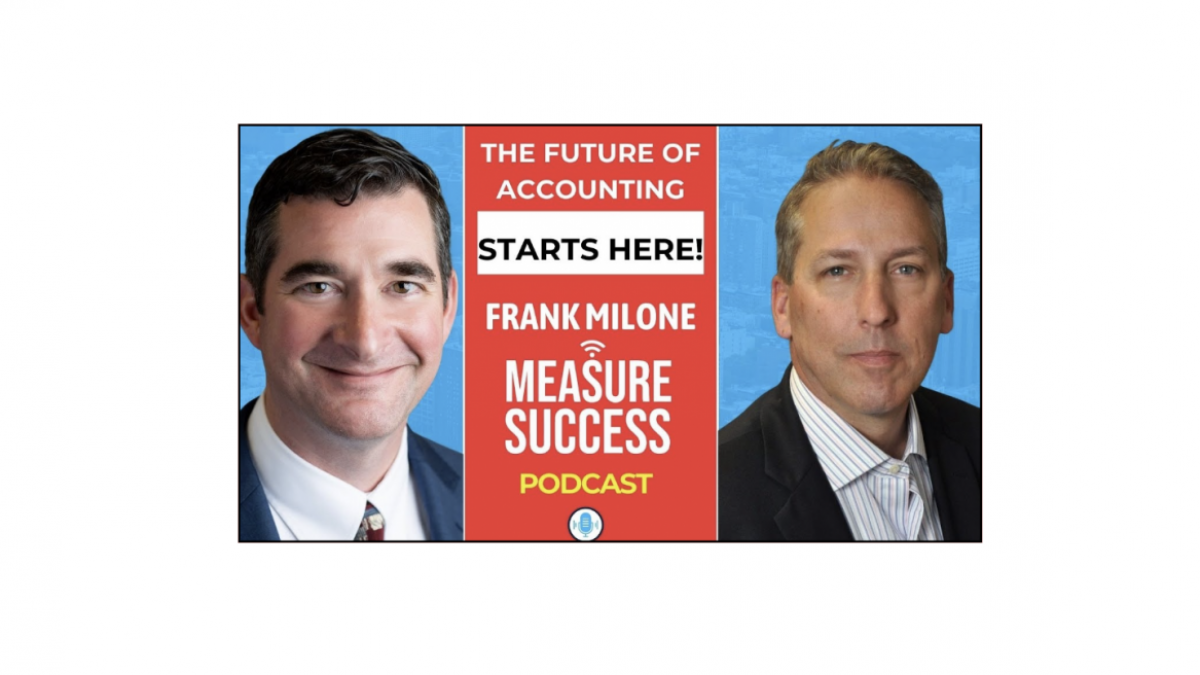FML founding partner Frank Milone was a recent guest on the Measure Success podcast with host Carl J. Cox for an episode titled “The Truth About Starting a CPA Firm.” Frank talked about how he and co-founders Jeff Fiondella and Lisa (LaSaracina) Willauer decided to take the leap and launch FML more than two decades ago.
Frank also discussed the current trend of M&A activity within the accounting industry, maintaining independence, and what founders of emerging companies need to know in the early stages.
Listen to the full episode on Apple Podcasts, Spotify, Audacy, or wherever you get your podcasts. Here are some excerpts:
On FML inverting the model in its early years: “We had the three partners, but then we hired a bunch of senior-level people, five- to eight-year people underneath us, because we needed people that were experienced and could work independently. We couldn’t spend a lot of time putting four, five people on teams. So we inverted the model. We attacked the market that was available, and then it gave us time to work through our non-competes, which were respected immensely, and then we also built longer sales cycles. So we were building audit sales cycles and tax sales cycles that were longer, but doing that while we were working on the consulting revenue-driving technique, and then eventually, over three to five years, that model kind of flips back into a more traditional model, which is leveraged. Now the margins increase, and now you’re transitioning into a more mature model. And now you’re focusing on revenue growth, but you’re also focusing on margin growth and other aspects of driving a business. And that was done out of necessity and instincts; I don’t know how else to explain it. You do it based on reading the market, reacting to the market, focusing on two or three critical issues within your business growth, and then strategically you assess and adjust as you kind of build that business.”
On creating an audit firm for emerging companies: “There’s a ton of value to add into [emerging] companies, which is one of the reasons why we got totally engaged in the emerging companies practice, which no one was doing at a small-firm level back then. In 2002 those emerging companies, venture capital-backed companies, they were all audited by national accounting firms. So there were the big firms and then there were really small firms that were doing mostly tax-related work. We created an audit firm and a tax firm, and people thought we were crazy. They were like, ‘What are you going to audit? There’s nothing for you guys to audit other than maybe reviews and compilations.’ So I don’t know if we had the vision, but we knew the market was there. We knew we could attack a market that was becoming available because no one else could do it.”
On the M&A trend in the accounting industry: “We’re taking advantage of the M&A activity by not getting acquired and just following the M&A trend and just continuing to service our clients and get access to bigger and bigger clients as the M&A happens. You’ve been on our website — it’s a service-based value. We are a value-based firm, a service-based firm and a problem-solving firm. Everything else takes care of itself. If you add value to your relationships, the fees and the structures and all that stuff that people worry about constantly, those things are not pain points.”
On long-term planning and maintaining independence: “Our strategy and our focus has been, for the last three years and now for the strategic plan we just developed for five years, how do we maintain our independence? So all of our strategic thinking, all of our strategic planning, all of our operating plan, all of our hiring, everything is driven on maintaining independence. If somebody wants to come in and offer us a huge number, OK, but that’s not what we need to do. So we will evaluate it based on what the equity partner group and what the partner group wants to do in the long term, not on a short-term decision.
On the importance of having the right advisors: “If you’re not educated or finance savvy or understanding of certain terminologies, you can get yourself in a world of hurt by not understanding and not having the right experts around you when you form your company. And the legal aspects are super important, the accounting aspects, the tax consequences of making those decisions early on cannot be reversed. … We do a lot of mentoring and advising for companies to just make sure they’re aware that there are really important decisions that get made when your company is really small that are going to impact you about four or five years down the road.”


